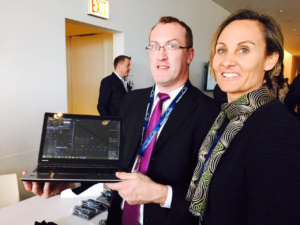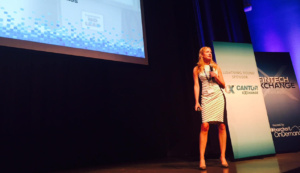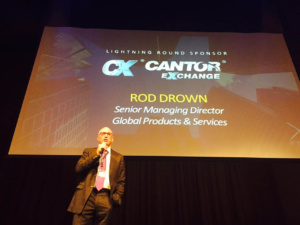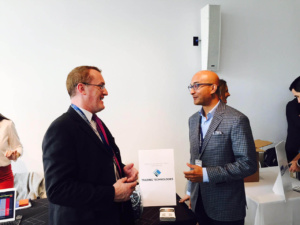America’s institutional exchanges are heading into the retail FX world – Op Ed
The global retail FX business that dominates London, Limassol and Sydney treads a distinctly separate line to the exchange-based institutional derivatives industry in North America…. or does it? The distinction between the OTC retail FX business that comprises non-bank liquidity providers, FX firms, established platform vendors, market news providers and prime brokerages and North America’s […]

The global retail FX business that dominates London, Limassol and Sydney treads a distinctly separate line to the exchange-based institutional derivatives industry in North America…. or does it?
The distinction between the OTC retail FX business that comprises non-bank liquidity providers, FX firms, established platform vendors, market news providers and prime brokerages and North America’s electronic exchanges, and the corporate giants that dominate Chicago has been, since the rising to prominence of retail OTC FX, vast.
Indeed, two separate ecosystems have existed, both equally intertwined with the service providers that relate to each, but both intrinsically separate.
Until now
Over the last few years, a global retail FX industry, with all of its components ranging from liquidity firms to technology providers to the actual retail brokerage itself, has grown substantially and centered itself in what have become premier destinations for retail FX. It is a huge and sophisticated business, and very well integrated indeed, however it has borne no relation to Chicago’s giants such as CME Group, ICE, Cantor Fitzgerald and NASDAQ… until now.
The dynamics at industry events and conferences have thus far been testimony to the two completely separate ecosystems – retail-specific conferences hosting bridge firms, platform vendors, payment providers and brokerages, all of whom are very familiar with each other’s position within the business, and exchange providers having their specific commercial and social structure, executives within that sector being equally familiar with the various providers and their corporate structure, the two different structures holding a similar relationship to divorced parents at their daughter’s wedding.

Last year, a few suggestions by retail FX executives with a background in the banking or non-bank institutional technology business made some serious suggestion that retail FX may well become the subject of regulatory requirements that could signal the beginning of exchange-traded retail FX, especially in North America, however many – including me – held the opinion that this would be very unlikely to be able to be executed because, despite regulatory leanings toward a central exchange in which pricing would no longer become the preserve of a brokerage’s dealing room, processing retail orders for average retail accounts via the giants of Chicago would be prohibitively expensive.
Those who had taken this view had considered that FX would remain transactable on an OTC basis because, despite regulatory will, exchange membership fees of over $500,000 per year plus clearing fees of a minimum $100,000 a month would prove completely prohibitive for most retail firms.
Already, once bearing in mind the net capital adequacy requirements in major FX jurisdictions which are $1 million in the UK, Australia, and Cyprus, and $20 million in the United States, the low spreads, high remuneration percentages for partners and introducing brokers (IBs), and then the bugbear that remains – cost of client acquisition and retention – a further very high cost would just not be viable.
It had been my opinion that perhaps some of the large exchange technology providers and derivatives market places may establish dedicated exchanges which would operate on a virtual basis, that can be deployed to the server of a retail brokerage and have minimal costs would appear, but this has not happened, leaving FX to soldier on as an OTC industry. Indeed, in the United States, FX is the only remaining OTC asset class in a post Dodd-Frank Act world in which every other electronically executable derivative is tradable solely through exchanges.
Last week, at the FinTech Exchange 2016 event in Chicago which was hosted by Barchart, it was clear to me that a completely different approach has become apparent, and it is being taken on by many large exchange technology firms.
Retail FX here we come
From news and analytics, through big data, to trading platforms, the exchange businesses are now rapidly expanding their services into the retail sector.

Imagine a Thomson Reuters or Bloomberg-style news and market data service that could be within the subscription budget of a retail trader with a $5,000 trading account. This is what CBOE LIVEVOL is launching tomorrow.
The new Amazon-style website which displays shopping history and is angled completely toward retail users will provide the same data and market information that the large proprietary trading firms and institutional desks of New York and Chicago rely on for their multi-million dollar business, but without the vast subscription fees that have until now kept these services out of reach of the retail trader.
Bringing futures into the hands of retail traders
Meeting with Ryan Hansen, President and Co-Founder of Tradovate on Wednesday last week in Chicago, it was clear that platforms which emanate from the institutional exchange sector are also now providing dedicated services for retail FX traders.
Having embarked on the development of the new trading platform after joining Tradovate during its inaugural stages in 2015, Mr. Hansen explained that the firm actually went into live business last week.

With regard to modernization within the futures sector, Mr. Hansen explained that “The cloud based aspect is certainly one of the things we are bringing to the market, especially in the futures space where this is somewhat new.”
“Windows based, downloadable technology is still prominent throughout the industry. This cloud based system is very new to futures” – Ryan Hansen, President, Tradovate.
In terms of how the exchange-traded futures market can now be placed within the hands of retail traders in any location, Mr. Hansen explained “The device neutral and platform neutral aspect is something we are bringing to the market.”
In terms of connectivity to venues, Mr. Hansen confirmed that Tradovate is connected to CME Group (which includes CME, CBOT, NYMEX and COMEX), ICE US & Europe, and Eurex derivatives exchange.

It is worthy of some degree of thought to consider how the MetaTrader 4 platform has been adapted in order to maintain pace with the ever-demanding requirements of retail traders across the world. Its origins as a closed system with fixed spreads which was connected to an internal dealing room became completely obsolete very quickly. With new retail-focused initiatives from exchange technology companies and their associated platform providers, the evolution may well go beyond the ubiquitous platform of choice among retail customers.
An interesting dichotomy here is the predilection for CFDs that had prevailed last year.
Following the Swiss National Bank’s removal of the 1.20 peg on the EURCHF pair, causing massive and unprecedented market volatility, some brokerages looked toward the expansion of their range of CFDs as a means of offsetting the risk of being exposed to negative client balances that spot FX created.
This seemed an unusual step to take, because CFDs are very difficult to clear, the spreads are wide, especially on non-FX products, and in certain jurisdictions, a ban on CFD trading may take place.
With exchange-traded futures contracts, the spreads are lower, and the market depth can be viewed in many cases up to 20 pricing levels which is the default among many electronic exchanges.
Dedicated platform providers are also going down this route.
Chicago based GX2 Systems provides a platform which executes spreads and provides traders with a means of conducting alpha generation, just as would be used by employees of proprietary trading desks.
The platform executes spreads of multiproduct, customized, relative value spread relationships at the limit price of the spread level, and does not leg the spreads.

According to the company, GX2 is not a traditional independent software vendor (ISV), and is a platform comprised of a trading desk, execution algorithms and risk management. The functionality allows actionable prices on customized spreads, baskets, or strategies. With GX2, users no longer have to worry about colocation costs or infrastructure costs and can manage their own limit order book whilst trading on a cross-venue, cross-asset class spreading basis.
As retail traders began to become more sophisticated and gain a much fuller understanding of the FX business, emulation of the non-bank institutional trading modus operandi ensued, with variable spreads being demanded and direct market access via aggregated liquidity and the rise of bridge providers which engineered software to adapt the MetaTrader 4 platform to be connected to a live market, keeping the familiarity and compatibility with third party software such as EAs (expert advisers) that MetaTrader 4 has always been popular for, but whilst providing the direct access to the point that the vast majority of prime brokerages today are providing live, aggregated bank liquidity via highly advanced aggregation systems to MetaTrader 4 brokerages.
In conclusion, it is now very clear that the retail FX industry is in the sights of the large institutions and the ecosystem that has built itself up around Chicago’s finest, and whilst the approach is not as first may have been anticipated, it is most certainly very much a reality.
Featured photograph: Downtown Chicago, home to the world’s largest electronic derivatives exchanges. Photography copyright FinanceFeeds









